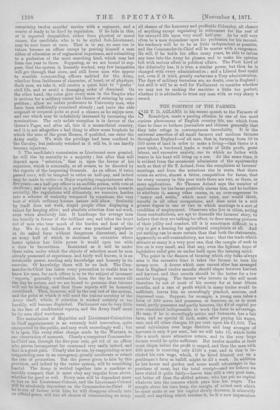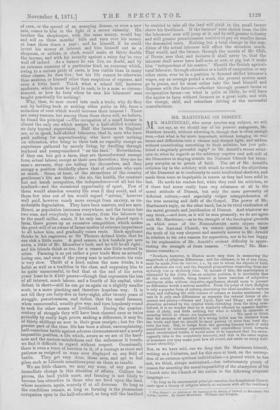THE POSITION OF THE FARMER.
SIR T. D. ACLA.ND, in his recent speech to the Farmers of Broadclyst, made a passing allusion to one of the most curious phenomena of English country life, one which from time to time so bothers journalists and citizens generally that they take refuge in contemptuous 'incredulity. It is the universal assertion of all small farmers and medium farmers throughout England—of all men, that is, farming from 50 to 350 acres of land in order to make a living—that theirs is a poor trade, a burdened trade, a trade of little profit, great•- labour, and excessive anxiety, one to which no father with brains in his head will bring up a son. At the same time, it is evident from the occasional admissions of the squirearchy such as that of Sir T. Aclancl, from the complaints at farmers' meetings, and from the notorious rise in rents, that there exists an active, almost a bitter, competition for farms, that for every vacancy in this poor trade there are two, or three, or more applications. Sir Thomas Acland says the number of applications for his farms positively alarms him, and he inclines to attribute it, among other causes, to an over-eagerness to "marry and settle," which must exist, one would think, equally in all other occupations, and does exist in a still greater degree in one or two in which marriage is a sort of condition of employment. Observers who live in cities, noting these contradiction, are apt to discredit the farmers' story, to believe that they are talking for effect, to draw sneering pictures of their jollity and comfort, till it is sometimes difficult in a city to get a hearing for agricultural complaints at all. And yet nothing can be more certain than that both the statements, apparently so self-contradictory, are true ; that the trade which attracts so many is a very poor one, that the margin of cash to live on is very small, and that any, even the lightest, hope of legislative relief gets an undue hold upon the farming mind. The point in the finance of farming which city folks always miss is the excessive time it takes the farmer to turn his money over. A decree which man cannot alter has arranged that in England twelve months should elapse between harvest and harvest, and that cereals should be the better for a few months' keeping. The farmer who invests in the soil must therefore be out of most of his money for at least fifteen months, and a rate of profit which in many trades would be sufficient, leaves him an exceedingly pinched, anxious, and depressed man. Suppose, for example, a young man takes a farm of 200 acres, and possesses, or borrows, or, as is most usual, partly possesses and partly borrows, the £8 of capital per acre considered indispensable to work the farm to advantage. Ho may, if he is exceedingly active and fortunate, has a fair
farm, and no special ill luck, make, after paying his wages, rent, and all other charges, 10 per cent. upon his £1,600. The usual calculation over large districts and long averages of harvests is only 8 per cent., but we will take 10, which looks like a much more attractive return, and to the very large farmer would be quite sufficient. But twelve months at least must elapse before the profit is reaped, and thus the man with 200 acres is receiving only g160 a year, and in this is in- cluded his own wage, which, if he hired himself out on a gentleman's farm as bailiff, might be £2 a week. In addition he has house and garden and some small advantages in the purchase of meat, but the total receipt—and we believe we have stated it quite fairly—leaves him still a very poor man, not better off than the skilled artizan, who has put no capital whatever into the concern which pays him his wages. The margin above his bare keep, the margin of actual cash which he must make or see his capital slowly decrease, is miserably small, and anything which touches it, be it a new importation of corn, or the spread of an annoying disease, or even a new rate, comes to him in the light of a severe calamity. His brother the shopkeeper, with the same money, would buy and sell on three months' bills and turn over his money at least three times a year ; and he himself, if he could invest his money at interest and hire himself out as a shopman, or artizan, or clerk, would make at thirty double the income, and with his security against a rainy day be very well off indeed. As a farmer he can live, no doubt, and by an extreme economy of a particular kind, an economy which, owing to a certain pride of caste, is less visible than in many other classes, he does live ; but his life cannot be otherwise than anxious, or himself other than suspicious of expense, and even a little hard. Think what a school bill, however moderate, which must be paid in cash, is to a man so circum• stained, or how he frets when he sees his labourers' sons taught practically for nothing I Why, then, do men crowd into such a trade, why do they not, by holding back or seeking other paths in life, force a reduction of rent which would increase their interest There are many reasons, but among them these three will, we believe, be found the principal :—The occupation of a small farmer is almost the only one which assigns to a half-skilled workman no duty beyond supervision. Half the farmers in England are, so to speak, half-skilled labourers, that is, men who have paid nothing for apprenticeship, who have spent nothing on education, who bring to their task no capacity except an experience gathered by merely living, by dwelling through boyhood and young-manhood "on the land." Nevertheless, if they can but got a farm, they are thenceforward exempt from actual labour, except at their own discretion ; they are no man's servants, they are toiling for themselves, and they occupy a position decidedly above that of artizans who earn as much. Some, at least, of the attractions of the country gentleman's life are theirs ; the air, the health, the constant but not harsh occupation, the independence—of all but the landlord—and the occasional opportunity of sport. Few of them would abandon country life even if they could, and of those few nine out of ten would regard "service," however well paid, however much more exempt from anxiety, as un- endurable degradation. They have been masters, and are men. Hence, as population increases everywhere, and the farmer has two sons, and everybody in the country, from the labourer up to the small miller, wants, if he only can, to be placed upon a farm, there grows up an excessive competition, which makes the good-will of an owner of farms matter of extreme importance to all below him, and gradually raises rents. Each applicant thinks in his eagerness, as Sir Thomas Acland hints, that he can risk a little more. A good season, a few bushels per acre extra, a little of Mr. Micawber's luck, and he will be all right ; and his friends think so too, for a reason also little noticed in cities. Farming is as yet rather a poor trade than an actually losing one, and even if the young man is unfortunate his ruin is very slow. Thrift of a kind, unless the man drinks, is a habit as well as a tradition in the class, and supposing him to be quite unsuccessful, to find that at the end of his seven years' lease he is £400 poorer—though that represents the loss of all interest, much labour, and a fourth of his capital, utter defeat, in short—still he can go on again on a slightly smaller scale, in a more pinching and therefore hopeless way. It is not till they are forty-five or forty-eight, after twenty years of struggle, penuriousness, and defeat, that the small farmers, when unsuccessful, usually give way, and turn hopelessly round to seek for other means of livelihood. During the quarter- century of struggle they will have been cheered once or twice probably by really high prices, making a difference, it may be, of thirty shillings an acre in their gross receipts ; but for the greater part of the time life has been a silent, uncomplaining, half-conscious battle against adverse circumstances and a nearly impossible position, a life which, aware as we are of the hard- ness and the narrow-mindedness and the sullenness it breeds, we find it difficult to regard without respect. Occasionally i there s even atrace of heroism in it, of a courage as stout and patience as resigned as were ever displayed on any field of battle. They got very dour, these men, and apt to feel gibes such as Liberals sometimes pour on them as insults. We see little chance, we may say none, of any great or immediate change in this situation of affairs. Culture im- proves, the land yields more, and farming is not likely to become less attractive to those who are bred upon the land, whose numbers, again, scarcely if at all decrease. So long as the conditions remain, so long as farming is the pleasantest occupation open to the half-educated, so long will the landlord be enabled to take all the land will yield to the small farmer above his livelihood. If the farmers' sons shrink from the life the labourers' sons will jump at it, and by still greater industry and still greater penuriousness contrive to pay on smaller farms the demanded rents. Nothing but a total change in the con- dition of the actual labourer will affect the situation much. That would, and the farmer, through the mouth of Mr. Clift, of Devon, sees that, and declares it shall never be, that the labourer shall never have half-acre, or cow, or pig, lest it make him "independent of his master." Should the British agricul- tural labourer, through education or a habit of emigration or any other cause, ever be in a position to demand skilled labourer's wages, say an average pound a week, the present system must go to pieces, and he must either take the land himself and dispense with the farmer—whether through peasant farms or co-operative farms—or, what is quite as likely, he will force the squire to farm without farmers on a great scale, and with the energy, skill, and relentless driving of the successful manufacturer.



































 Previous page
Previous page